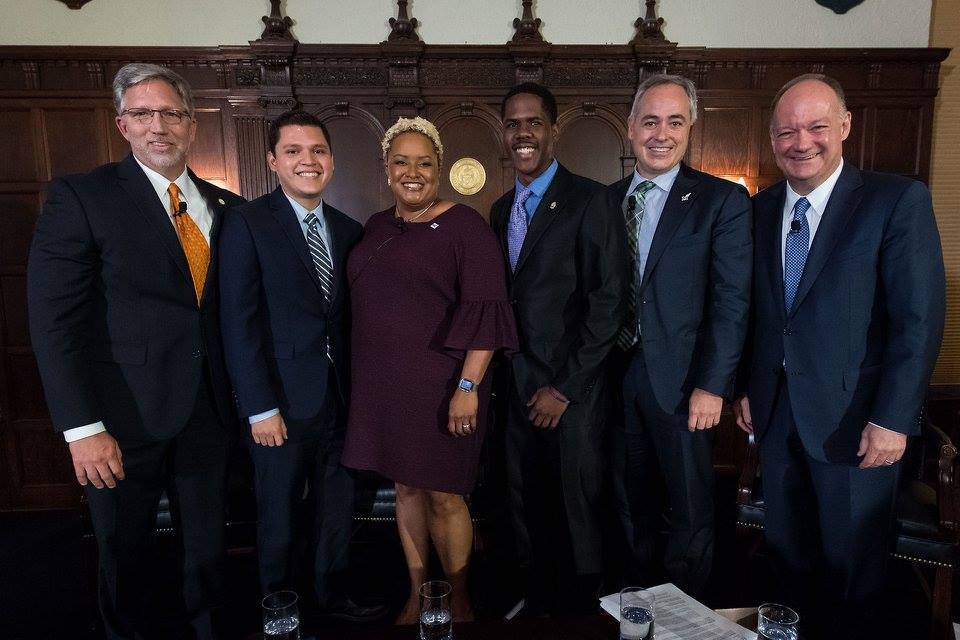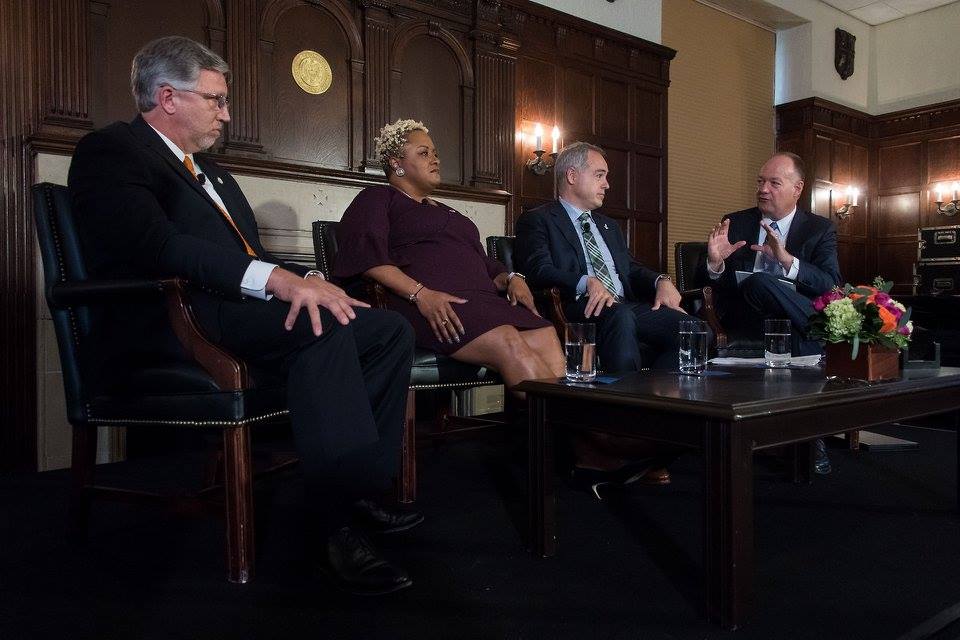Remarks at “Dreamers Making a Difference on Campuses and in Communities”
Good morning. Thank you all for being here. It’s an honor to be with you and to welcome you to Georgetown. We’ve come together from places across Maryland and the District of Columbia and Virginia to reflect on the importance of protecting our Dreamers—our young people brought here as children and raised as Americans.
We have the privilege of being joined by three special guests, leaders of colleges and universities from Maryland and Virginia who join us in support for Dreamers and the Dream Act. In just a few minutes, we’ll welcome to the stage our distinguished panelists:
- Dr. Ángel Cabrera, President of George Mason University;
- Dr. DeRionne Pollard, President of Montgomery College; and
- Dr. Scott Ralls, President of Northern Virginia Community College.

Event speakers and panelists. From left to right: Scott Ralls, Ph.D., Luis Gonzalez (C’19), DeRionne Pollard, Ph.D., Kamar Mack (C’19), Ángel Cabrera, Ph.D., and John J. DeGioia.
As we begin our event, I’d like to welcome each of them and all of our faculty, staff, and students who are with us today, and especially those of you who are part of our undocumented and immigrant communities. I’d like to thank you all for being here.
Our gathering today marks the opening of a week in which higher education institutions around the country, in collaboration with the American Council on Education (ACE), are coming together to “Protect Dreamers” through dialogues and gatherings, social media campaigns, and advocacy on behalf of our undocumented students. We’re especially honored to have Ted Mitchell, the President of ACE, with us this morning. Ted, thank you.
The shared goal of this effort led by ACE is to encourage Congress to pass bipartisan legislation as soon as possible that includes all of the protections provided under DACA and allows these young people—23,000 of whom live here in Washington D.C., Maryland, and Virginia1—a path to citizenship so they may continue to live, work, and serve without fear or threat of deportation.
At the close of today’s event, Kamar Mack (C’19), our Georgetown University Student Association President, will introduce some opportunities for everyone here to join our efforts.
Before our panel begins, we have an opportunity to hear from one of our students, an extraordinary leader in our community who is deeply committed to service and education, Luis Gonzalez (C’19). Luis will offer some remarks about his journey and the impact of DACA on his life, and he will then introduce a short film that features his reflections and those of three of his peers.
Our Dreamers—those at Georgetown, those at Montgomery College, George Mason University, and Northern Virginia Community College, and all across our nation—are essential to our communities. We are fortunate to have you as members of our communities—you belong here. We’re here today because of these extraordinary young people.
Since arriving as children, Dreamers have become part of the fabric of our nation. Today, their contributions and service…their aspirations and accomplishments strengthen our communities, our national economy, and our global competitiveness. We must do our part to ensure that their paths to learning and prosperity are not undermined by failure to enact the DREAM Act.
With the introduction of the DREAM Act more than a decade and a half ago, concerned individuals around our nation have sought to ensure that the challenges facing our undocumented and immigrant communities are recognized and addressed.
Especially in the years since DACA was put in place, more and more of our young people, with courage and conviction, have helped to drive awareness of the Dream Act and to garner support on a national scale. These contributions to our national discourse on immigration are incredibly important in ensuring that we can fulfill, as a nation, our responsibilities to one another.
While we seek to advocate for the legal presence of these young immigrants, we must also protect the opportunities that they have to pursue their studies and enable them to focus on their primary role on our campus—that of being a student.
Almost half—45%—of DACA recipients are currently enrolled in school or college. And of that 45%, more than 90% are pursuing an associate’s or bachelor’s degree (or higher).2
These young people have overcome many challenges to earn a place at our colleges and universities—and these challenges continue while they are enrolled, they continue after they graduate, they continue even under the DACA program, after they enter our workforce. They are not eligible for federal loans or Pell grants…they often support their families while in school…and they live with the fear of deportation, either for themselves or their families and their friends.
On each of the occasions that I have met with our undocumented students here at Georgetown, I have sought to reassure and remind them of two things: first, that each one of them belongs here. Their membership in our community is not only welcomed…but vital; and, second, that they are a part of a community that is committed to ensuring they can succeed in an environment that is free from constraint or fear.
We have a role to play—as colleges and universities—in seeking to advocate for the safety of our students. It’s our job, as educators, to support all of our students and to find ways of ensuring that they are able to realize their full promise in their pursuit of education.

Access to education is fundamental to our rights as human beings
This is what brings us together today—a shared understanding that access to education is fundamental to our rights as human beings…and that it is time these young people, brought here at a young age, be accorded a path to citizenship that will allow them to continue to contribute as members of our society.
So I’d like to thank all of you for joining us today, and to take this opportunity to welcome to the podium an exceptional member of our community, Luis Gonzalez.
- Information from USCIS data.
- Deferred Action for Childhood Arrivals (DACA) Fact Sheet